Anyone remember that movie about The Runaways? Yeah, it got fairly awful reviews, but I will admit that I went to see it twice, and that I paid both times. Yes, for real. (This is a story for a different post.)
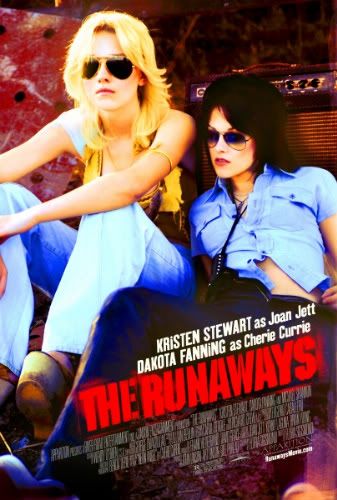
I concede that the poor reviews are not entirely undeserved. The acting is pretty good, and the subjects are so fascinating, but The Runaways has a lot of technical problems, the worst being that the script doesn't quite tell a coherent story. Sure, you see a band getting together, rehearsing, getting on the road, getting signed, getting fucked up and having a lot of sex with various partners, and then breaking up -- but nothing in the movie is really explained. Not even what motivated the band to get together, or what the band accomplished as the first all-girl rock band. It's like there's tons of story there, but director Floria Sigismondi can't be bothered to actually tell it, because she's too busy with her needlessly weird and typically unsubstantive imagery.
The story that does inadvertently get told is a provocative one that is relevant to any girl, woman, or ladyman who has any serious career ambitions (musical or otherwise). Based on a memoir written by original vocalist Cherie Currie, The Runaways ends up being about her struggle to survive tour while wrestling with guilt about leaving her troubled family.
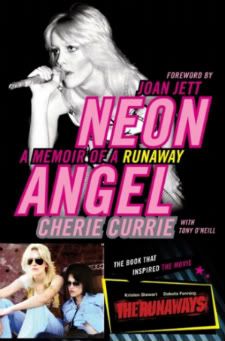
In her first scenes in the movie, Cherie seems like a typical California teenager who likes to do atypical things. She quietly defies her classmates and family by cutting her hair into a ragged Ziggy Stardust-type coif, wearing Ziggy-style makeup all over her face, and eventually flipping off her classmates while performing a David Bowie song during her school talent show. What we don't know is that the real Cherie Currie did these things in part because she was struggling to recover from the trauma of being raped by her sister's boyfriend. (According to Currie, this wasn't in the movie because the filmmakers wanted her to 'lose her innocence' later in the movie. Hmmm.)
The first scenes of the movie focus on other things that made Cherie's home life less than satisfying. We see Cherie's neglectful mother, who takes off for Indonesia with her new husband just after Cherie joins The Runaways. We see Cherie's twin sister, who is less than sensitive to Cherie's insecurity about feeling like the 'lesser' twin. We see Cherie's caring, kindly father who is also an alcoholic who is in poor health.
This effectively conveys Cherie's unhappy, stressful existence, but it also singles her out as the 'one with the family issues'. We don't learn anything about the other band member's families, we don't meet any of their mothers or fathers or grandparents or siblings. Drinking and talking by the Hollywood sign, Cherie asks Joan Jett and drummer Sandy West about their parents, and they both kind of shrug. Their parents aren't really present, they don't have curfews, it's not a big thing for them. That's the only mention of the other girls' families.
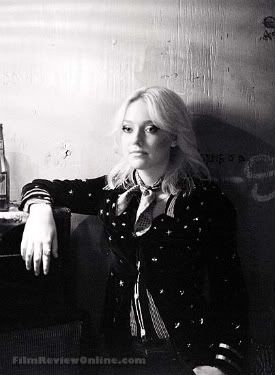
The screentime given to Cherie's home life comes off as almost intrusive. For example: in a particularly crushing scene, the rest of the band comes to pick Cherie up to go on their first tour just as the family discovers that Mr. Currie is passed out in his car, which is parked in the driveway. The girls gawk and Cherie reluctantly leaves as her sister and grandmother help her father drag his ailing body, which has already sort of fallen out of the car, through the front yard and into the house. Cherie is visibly embarrassed in front of her band, but no one offers any words of support or sympathy.
On tour, Cherie is the one who gets homesick. She's the one who worries about her family, she's the one who calls home and asks how things are there. No one else is shown engaging in any of these perfectly reasonable behaviors. Cherie is also the one who develops the serious drug problem.
The movie suggests, in other little ways, that Cherie is the weak link in The Runaways -- emphasis on 'weak'. On top of being the one with the family and substance abuse issues, Cherie's taste in music gets criticized as too 'middle of the road', and which is another way of saying 'weak'. Cherie is attacked for doing a solo photo spread that verges on pornographic, and is accused of needing attention; in other words, she's too weak to resist the camera. Cherie is the one who can't handle manager Kim Fowley's abusive behavior, the other girls are strong enough to soldier on despite his constant barrage of insults.
When Cherie finally leaves the band, she uses her family, and her father's illness, as her reason for doing so. She tells Joan, "I need to be with my family," which is strange to me because Cherie has so many good reasons to leave the band that have nothing to do with her sick dad. Why doesn't Cherie just say that she's unhappy, or that her body can't handle the constant touring/drugging/drinking/etc anymore? Using her family as an excuse conflates Cherie's problems and 'weakness' with her attachment to her family.
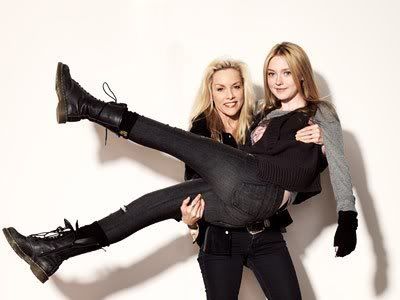
I don't mind the movie showing Cherie's descent into addiction or inability to deal with the pressure of being on the road or Kim Fowley's traumatizing and exploitative manipulations. Dakota Fanning's poker-faced portrayal comes off as a believable response to her frightening reality, and it makes sense that with little support or adult supervision, Cherie would turn to drugs and sex to deal with her problems. If that's Currie's story, and it seems it is, that's fine.
What irks me is this implication that Cherie's family, and her wanting to be with them, is the cause of her problems. The movie perpetuates the idea that women who focus too much on their families are weak and bound for professional failure, without doing a very good job of explaining all the other factors that impacted Cherie and the rest of the band.
This idea is already pervasive in Western society, especially in the United States, where things like maternity leave and access to childcare are generally seen as crazy feminist demands that male-oriented workplaces shouldn't have to accommodate (forget paternity leave and elder care). Also dominant in our culture is the message that anyone with female parts absolutely must put her family before herself and whatever professional goals or dreams she might have. The contradiction makes it incredibly difficult to juggle your responsibilities, and leaves women in general vulnerable to lots of undeserved criticism from all sectors of society, no matter what type of work you're in.
I like that The Runaways actually shows this struggle, and the way that it comes between women who work together. I guess I just wish that the movie had a happier ending, or at least one in which it doesn't feel like Cherie 'broken home' Currie is supposed to be some sort of cautionary tale, meant to contrast the family-less Joan 'I'm so tough' Jett and her colossal post-Runaways, post-Cherie success.
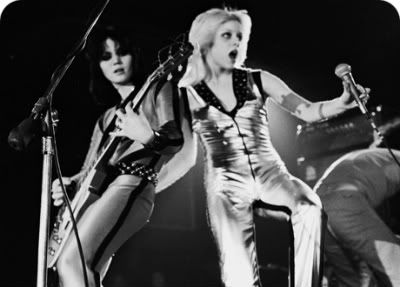
Because cautionary tales and depressing stories about girls who were too 'weak' to hack it aren't what we need. Every single girl I know, myself included, is struggling against inescapable social dictums that we don't deserve to be anything but servile to our families, often while also struggling against this irrational guilt we have for wanting more for ourselves. We already know how hard it is, we don't need to be reminded by standard rock bio-pics. What we need, as we finally find our like-minded artist and musician partners, is to see and know that things aren't as simple as Cherie or Joan, and that happier endings are possible for us, if not for Cherie.
2 comments:
I hate to give a stereotypical response here, but if this kind of situation had been portrayed about an all-men's band with the exact same circumstances, an excuse of family would have never been given. I have yet to see the movie, but I'm really disappointed hearing your assessment. Also, leaving out the rape is ridiculous, because that's a personality-shaping event. It didn't necessarily need to be on screen, but not even mentioning it was a mistake.
I was really disappointed too that they left out Cherie's rape, because how it shaped her could have been shown as something really empowering. If you read Cherie's memoir, you'll see that she's anything but a victim! She totally owns her problems with her family and how that and the sexual assaults she survived impacted her addictions, and I kinda think she's awesome.
As soon as I read that the director -- who also, for some reason, wrote the screenplay despite no writing experience -- was leaving out the rape, I had a bad feeling about the movie. But it's not all bad; I just wrote an article for a zine about how wonderful the Joan Jett parts of the movie are. Seeing her struggle to just learn how to play guitar with no support, and despite a lot of naysayery from douche-y teachers ("Girls don't play electric guitar"), was actually really validating for me, and made me cry a little bit, for real. It's totally worth the rental for that alone, and I do recommend it.
Also, I don't think it's stereotypical, but just a fact of life that family problems and issues would never have been focused on so much in a movie about male musicians. The biopics on Ray Charles and Johnny Cash both have heartbreaking stories of brothers who are killed in accidents, but Charles and Cash aren't portrayed as weak for grieving, or for self-medicating. No, instead, they're 'complicated', and have this weird flawed hero thing going on. I loved both those movies (and love both those musicians), but what a lot of sexist spin!
Post a Comment